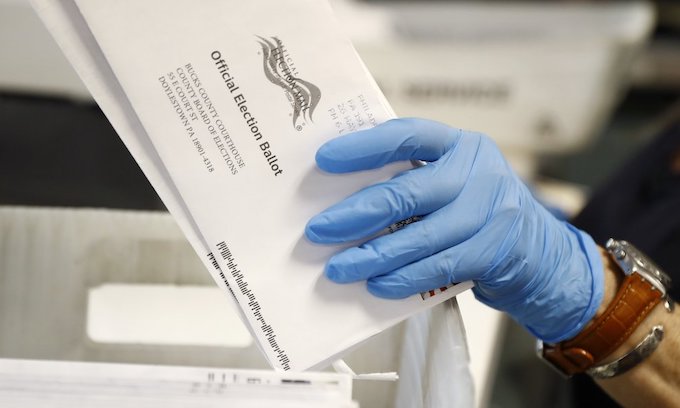Arab American advocates are asking the city of Dearborn to provide more voting information and ballots in Arabic language with the Aug. 3 primary for local races approaching.
After complaints from civil rights advocates, the city added to its website Thursday an absentee voter registration form in Arabic, said Abed Ayoub, legal and policy director for the American-Arab Anti-Discrimination Committee. The city also has had a voter registration application in Arabic on its website.
But Ayoub and others say that while the move this week is welcomed, it falls short of what is needed to ensure the city is offering Arab Americans equal access to voting. Activists said the city still doesn’t have Arabic-language ballots, Arabic-language options on its website to alert non-English speakers to the forms, and there is no drop-off box or satellite location in the eastern part of the city, which has sizable numbers of Arab Americans.
“For a city like Dearborn, which has the largest number of Arab Americans in the country, this should have already been available to our residents,” said Nada Al-Hanooti, executive director of Emgage Michigan, which advocates for Muslim Americans and Arab Americans.
Voters this year will choose a new mayor, with the incumbent not running for the first time in 35 years, and also seven council seats. Several candidates running would be the first mayor of Arab descent in the city’s history if they were elected. The top two mayoral candidates in the nonpartisan August primary will advance to the November election.
Dearborn is about 47% Arab American, according to data from the U.S. Census Bureau. But voting turnout in areas where Arab Americans make up a large percentage, such as the eastern and southeastern sections, is much lower, according to voting data.
“With the largest concentration of Arab Americans, the city clerk should on his own initiative make sure that all voting information is available in Arabic, including on the web,” Ayoub said. “It’s skewing voter participation and it’s a method of voter suppression.”
Voter data shows that absentee voters from the western part of the city are requesting and casting ballots at a higher rate than the eastern part.
The number of registered voters in the city is 37,548 in the western part of the city, which is 55% of the voters, and 30,137 in the eastern part, which is 45%, Ayoub said.
Out of 7,137 voters in Dearborn who have requested absentee ballots, 5,775, or 81%, are from the western part of the city while only 1,362, or 19% are from the eastern part.
As of Thursday, 2,632 residents have already voted by absentee for the Aug. 3 primary, according to city data obtained by Adel Mozip, a trustee at Dearborn Public Schools.
Out of those who have voted so far, 1,961, or 75%, are from the western part of the city and 716, or 25%, are from the eastern part, which is more heavily Arab.
Ayoub said the data shows that the city’s lack of Arabic materials and outreach to Arab Americans is leading to the disparity between west and east in the number of ballots being requested and returned. And that disparity can lead to weakened political power for Arab Americans, which hurts them as seen in the recent floods that largely affected the eastern part of the city, advocates said. Arab American protesters have accused the city of neglecting flood control in their neighborhoods.
Ayoub and other Arab American advocates said that the city needs to have more Arabic-language options on its website in general. The city of Miami, for example, has Spanish and Haitian Creole options on its homepage, while Dearborn does not provide an Arabic option.
After the June 25-26 floods, the city of Dearborn did include an Arabic-language option for residents to fill out for flood claims. But there were “20 translation mistakes that I can count” and unlike the English-language option, it was in a PDF format that “the people have to print and bring to the city for reporting a flood,” Adeeb Mozip said at the Deaborn City Council meeting on Tuesday.
On July 9, Ayoub sent a letter to Dearborn Clerk George Darany, copied to city council members, saying that “several residents … have expressed concern over the lack of voting information in Arabic available on the official clerk’s office website. Particularly the information about absentee ballots is all in English. Given the large Arab population in Dearborn it would be beneficial to have this information available.”
Darany did not respond Friday to messages from the Free Press.
In his response on July 12 to Ayoub, Darany said there’s not a great need for Arabic-language information.
Darany wrote in an email to Ayoub reviewed by the Free Press: “My office has only recently been contacted by a few residents requesting that election materials be written in Arabic. … In my mind, this means that the need for Arabic election information is not widespread. If so, we certainly would have heard more about it with only three weeks left before the Primary.”
Darany added that his office has Arabic speakers to assist people who come to the office.
“Many Arabic-Only speaking voters come to the Clerk’s Office daily to vote absentee,” Darany wrote. “They usually bring a relative to help them with the translation. If they do not have someone to help them, we have Arabic speaking employees to help.”
Darany said in his email: “I want to make clear that accessibility to voting is provided to EVERY REGISTERED VOTER regardless of what primary language they speak. We are currently working on having sample ballots in Arabic available on the City of Dearborn website and at the polls on Election day. Arabic speaking poll workers are currently being assigned where needed. We also hope to have sample Absentee Ballot Applications in Arabic available soon. Also, a Voter Registration Form is currently available in Arabic on the City of Dearborn website.”
Regarding criticism that the city does not have a drop-off box or satellite in the eastern part of the city, Darany said in a Facebook post earlier this year responding to Ayoub that the drop-off box available at the Dearborn Administrative Center “is located in the center of the city … no more than a 15 minute drive from any resident.”
Darany also said that fewer residents will be voting in the primary and that “the clerk’s office does not have funding from the city, state, or federal government for staffing, training and setting up another office.”
Contact Niraj Warikoo: [email protected] or Twitter @nwarikoo
©2021 www.freep.com. Visit freep.com. Distributed by Tribune Content Agency, LLC.
—-
This content is published through a licensing agreement with Acquire Media using its NewsEdge technology.



















Since they are Arab AMERICAN, how about learning the English language. Were we to go to their country, would we be given ballots in English? And while you’re at it, vote in person on election day—do not listen to Dem propaganda.
Yes, and here we go again. How much to American taxpayers spend so that Spanish, Vietnamese, Chinese, and Arabs can get all the benefits of America without learning the language we speak here. ENGLISH ONLY NOW!
IT used to be, you HAD TO SPEAK AND READ FLUENT English to even become a citizen.. NOW WE are literally re-writing our laws, to CODDLE IMMIGRANTS?? W hat next? BANNING English from federal documents, cause it offends them!
As a retired adult English as a second language instructor I absolutely agree that immigrants’ priority should be learning English in order to assimilate. However, the reality is that many, particularly older, immigrants either don’t attend classes or have a difficult time learning, although I did have a fair number of Spanish, Chinese, Vietnamese, and Burmese seniors in my classes. Also, multi-lingual voting materials are provided in multiple languages in some states, including here in CA, a practice I disagree with for the most part. If materials are provided in Spanish and Chinese why not Arabic? Either stop it in all languages or provide materials in languages that align with dominant populations in an area. Bottom line- more pressure should be put on immigrants to demonstrate English proficiency and/or enrollment in English classes during the immigration process, in my view. Access to ballot assistance/translation in a designated language can be made available by phone, online, or in person, but ballots should be printed in English. I say that as a linguist and having studied in two foreign countries. When in Rome….
VOTING ballots, just like EVERY OTHER FEDERAL GOVT DOC/paperwork, should only EVER BE PRINTED IN ONE Language..
E
N
G
L
I
S
H.
EITHER LEARN IT or leave our nation.
To apply for naturalization to become a U.S. citizen, you must:
Be at least 18 years of age at the time you file the application;
Have been a lawful permanent resident for the past three or five years (depending on which naturalization category you are applying under);
Have continuous residence and physical presence in the United States;
Be able to read, write, and speak basic English;!!!!!!!!!!!!!!!!!!!!!!!!!!
Demonstrate good moral character;
Demonstrate a knowledge and understanding of U.S. history and government;
Demonstrate a loyalty to the principles of the U.S. Constitution;
Be willing to take the Oath of Allegiance.
https://www.uscis.gov/forms/explore-my-options/become-a-us-citizen-through-naturalization
It’s the law – follow the law
PITY it seems, yet again, that the dems LACK BASIC WILL TO ENFORCE the bloody law…
It’s the theme, speak English. next get congress to vote that as the official language and maybe we can save millions from having to interpret everything we do in this country.
IMO it should have bloody well, been MANDATED AS OUR national language, DECADES AGO.. Before all this “OH but we must print it out in their native tongue, to get more friendly to their culture” bull scrap started…
I have nothing against non-native (Naturalized) citizens (my wife is one)… BUT in order for her to become a citizen, she had to pass basic English test.
Why, then, someone NEEDS to have their ballot in any language other than English seems to go against the requirements to be a naturalized citizen.
Because for a good 2 decades or more now, it seems (To me at least), that requirement to SPEAK and read english to become a citizen, has NOT BEEN ENFORCED…
Since that was a condition for becoming a citizen, do we assume that these people trying to vote are not citizens? All this **** about having all forms and other documents in all these different is one big waste of taxpayer money. If they can’t speak or read the language then maybe they shouldn’t have the right to vote. We are talking about a group of people that are our sworn enemy and want to destroy our nation, yet we need to provide them with everything in their language. Is it any wonder this country has gotten so screwed up? I’m so glad I’m so old, and hopefully wont live to see the destruction of these United States of America, and the sad thing is we are doing it to ourselves.
COMMENTAre right to feel the way you do about special ballots in a different language other than English. I’m reminded of what russian PUTIN TOLD THE mUSLIMS , Putin said, ” Muslims need Russia, Russia doesn’t need Muslims. ” America should follow Putins example.
For once, i agree with putin!
It’s way past time to make English the official language of the United States of America. If immigrants find that they can get along without learning English, they won’t learn it. The extra paper, ink, translators, printing costs and many other expenses that are required to provide foreign language documents for immigrants are paid for by us.
If we don’t act soon, we’ll end up with a bunch of foreign-language enclaves instead of an American melting-pot. Learning enough English to ask someone for translation help isn’t all that difficult and it’s a good start.
IMO WE already have plenty of areas in our OWN NATION< where speaking ENGLISH there is seen as an anomaly, because of ALL THE FOREIGNERS IN THOSE hoods…
Tell them to buy an Arabic – English translation book or go back to whatever hellhole they ran for their lives to get away from. Ditto for any foreign speaking migrant.
We millions of “no dash” Americans didn’t ask foreign speaking Socialist welfare dependents or Islam bullies & pro terrorism believers to come here, much less for them to then expect / demand that we kiss their butts & be forced to sacrifice our society, culture, language & economic stability to suit them.
First English they need to learn is beggars can’t be choosers.
US citizens do not have to tolerate bossy domineering foreign speaking ingrates coming here telling us what we can or can’t do.
And hope we are not going to tolerate much longer the outright tyranny that the current lawless & power-mongering combine of Marxists, Dem Party politicians, cheap labor Corp profiteers & Soros style globalist multi billionaire anti American seditionists are inflicting on us either.
The Bible tells about the Tower of Babaulan and the division caused by different languages spoken and despite this warning we followed ,it seems that which was written on a plate Pn the ststue of liberty, Give me your tired and hungery, longing to be free…Then James Madison in “The Federalist Papers #2 ,” told how hee felt about the importance of acommonality of customs, Religion, and a common language spoken amonst the citizens not paluted by foreign tongues. James Madison said of the early colonists that providence hzs been pleased to give this one connected country to one united people A people desended from the same ancestors , speaking the same language. .. “How far we AsANation have fallen since James Madison wrote those words and now wwe are divided by a varity of foreign languages as never before and no longer do we stand as one united people with common ancestors….
I agree. SPEAK/READ English or get the hell out!
Another way to rig an election and keep the 4 eyed pig (Tlaib) in congress as long as Pelosi has been there.
If i had my way, EVERYONE who refuses to learn/speak/read english, would instantly AND FOREVER MORE BE KICKED the hell out of this nation, RIGHT ALONG SIDE every judge, mayor or politician, who REFUSES TO MAKE THEM learn it…